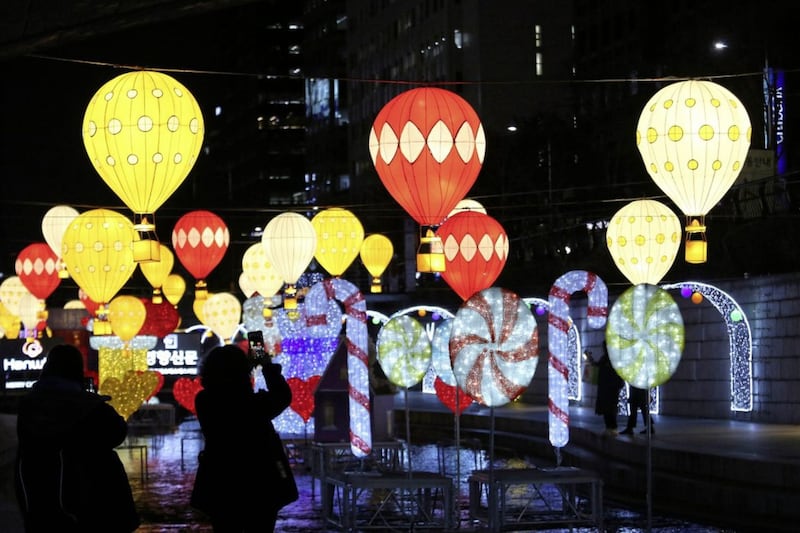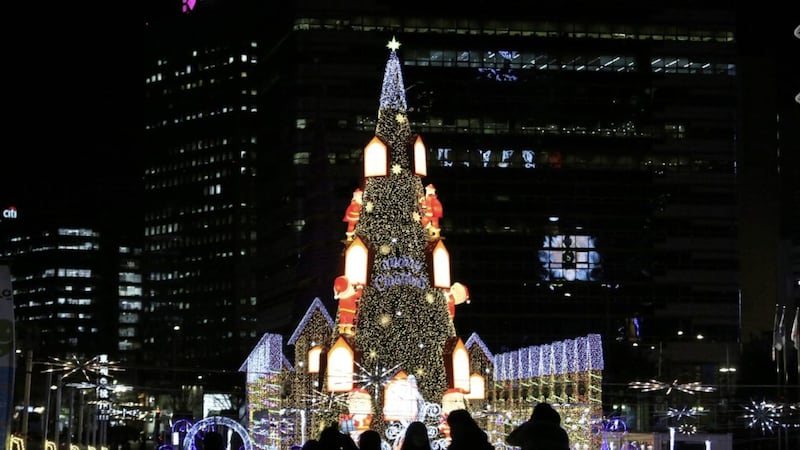
THE season of Advent is pre-eminently the season of expectation and hope. One might imagine it therefore to be above all a time of joy.
Yet in earlier ages, the season was marked by the kind of austereness traditionally associated with Lent.
In bygone days, fasting was expected in Advent from the faithful, dancing was frowned upon and church weddings were normally not permitted.
Some of this previously sombre quality of Advent is still retained in Catholic practice, as the restrained liturgical colour of violet, the absence of the Gloria at Mass, and the holding of penitential services during Advent would tend to indicate.
But, in general, the gloomier side of Advent has gradually yielded in more recent times to a brighter approach to the period.
This is perhaps unwittingly reflected in the way, for example, reference to 'the holy season of Advent' has almost imperceptibly been replaced in our culture by the expression 'the run-up to Christmas', to say nothing of the omnipresence of 'Christmas lights' in towns and cities throughout the land during most if not all the weeks of Advent.
It could be argued that such changes are not only all to the good, but are in fact more in keeping with the very essence of Advent, as the word itself might suggest.
For 'Advent' - meaning 'arrival' or 'coming', and derived from 'adventus', the Latin translation of the Greek New Testament term 'parousia' - refers to the (Second) Coming of Christ.
So, if people are looking forward to the arrival of God in their midst - even if God's imminent arrival, which Christmas seeks to enact, is more an anticipation or promise of humanity's final destination in heaven - what is there not to be joyful about?
Viewed in this perspective, the entire future could be regarded as a kind of protracted 'Advent', and would leave open therefore the need for, or - perhaps more accurately - the desirability of, hope, not just in the specific season of Advent every year, but indeed always.
This longer perspective on Advent practically compels us, however, to look a little more closely at the concept of 'hope' itself.
Reference to 'the holy season of Advent' has almost imperceptibly been replaced in our culture by the expression 'the run-up to Christmas', to say nothing of the omnipresence of 'Christmas lights' during Advent
Is it a notion that embodies or at least should embody unqualified joy at the thought of being on the way to a realm of cloudless bliss?
And, if so, would that not fully justify the more modern stress on Advent as a time of uplifting, joy-filled expectancy, rather than one of grim anxiety, which arguably was associated with the more penitential approach to Advent in the past?
A few digressions into the evaluations of 'hope' that can be detected in former times might, however, make us pause before accepting any clear-cut answers to such questions.
Before Christianity appeared at all, in ancient Greece 'hope' was seen as the one item left in Pandora's box, but it was apparently never unambiguously clear if it was a curse or a blessing for humanity.
The more recent well-known saying, "It is better to travel hopefully than to arrive", contains a strong hint that fulfilment is always going to be a disappointment. Does living with hope imply, then, being engaged in a fool's errand?
Germany's greatest writer, Goethe, who seemed especially favoured by fortune, had still ruefully concluded, apparently echoing sentiments of Martin Luther, that, "Anything in the world can be endured, except a series of wonderful days".
Nietzsche, more tersely, spoke about the 'melancholy of fulfilment'. In short, nothing fails like success.
And Oscar Wilde, a writer frequently associated with Nietzsche for his subversion of received wisdom, coined the witticism, "In this world there are only two tragedies. One is not getting what one wants, and the other is getting it" - a paradox suggesting that happiness is ultimately unattainable.
Or, as the distinguished Polish philosopher, Leszek Kolakowski, who died 10 years ago, put it: "Happiness is an escape from reality."
So where does that leave hope and Advent, the season of hope? The short answer is that it leaves it where, for Christian faith, it has always been.
Probably the earliest commentator on Christianity, St Paul, noted: "If for this life only we have hoped in Christ, we are of all people most to be pitied" (1 Corinthians 15:19).
Hope, in Christian culture, has at heart never been about a better, brighter future on earth, welcome though such progressive aspirations might well be.
It was more in the nature of a divine gift to help people through the travails of life, in the belief that perseverance in the face of adversity is worthwhile.
Immanuel Kant, sometimes known as the 'Philosopher of Protestantism', listed hope, alongside sleep and laughter, as the three gifts bestowed on human beings to counterbalance life's many hardships.
But precisely here, of course, Christianity's weakness is exposed - in that the hope it offers leaves itself wide open to scornful dismissal as 'make-believe' or 'pie in the sky'.
The tension between weakness and strength has always been intrinsic to Christianity. Where hope is concerned, its weakness is its strength
But again, this is nothing new. The tension between weakness and strength has always been intrinsic to Christianity. Where hope is concerned, its weakness is its strength.
For no amount of failure or disappointment in life can force anyone to abandon hope in God's ultimate triumph over evil, suffering, and death.
But equally, and indeed almost by definition, this triumph can only be enacted when death itself has finally been absorbed.
The shortcomings of life direct human hope inevitably, if obliquely, to something larger than life - to its creator and redeemer.
To keep in view both an awareness of life's unbudgeable parameters and the limitless extent of human hope, is the unique challenge the season of Advent represents.
Martin Henry, former lecturer in theology at St Patrick's College, Maynooth, is a priest of the diocese of Down and Connor.








